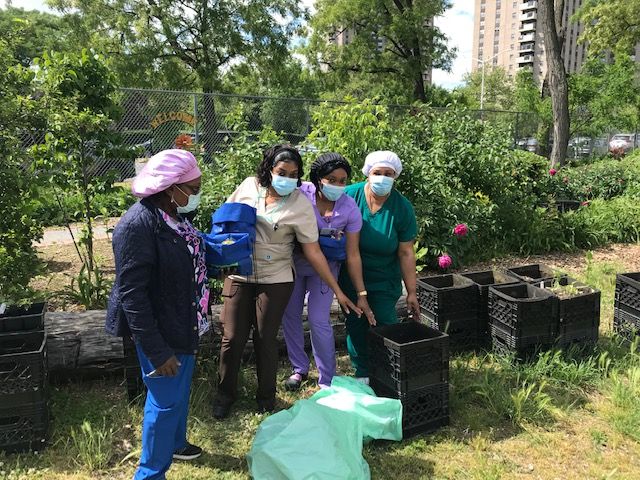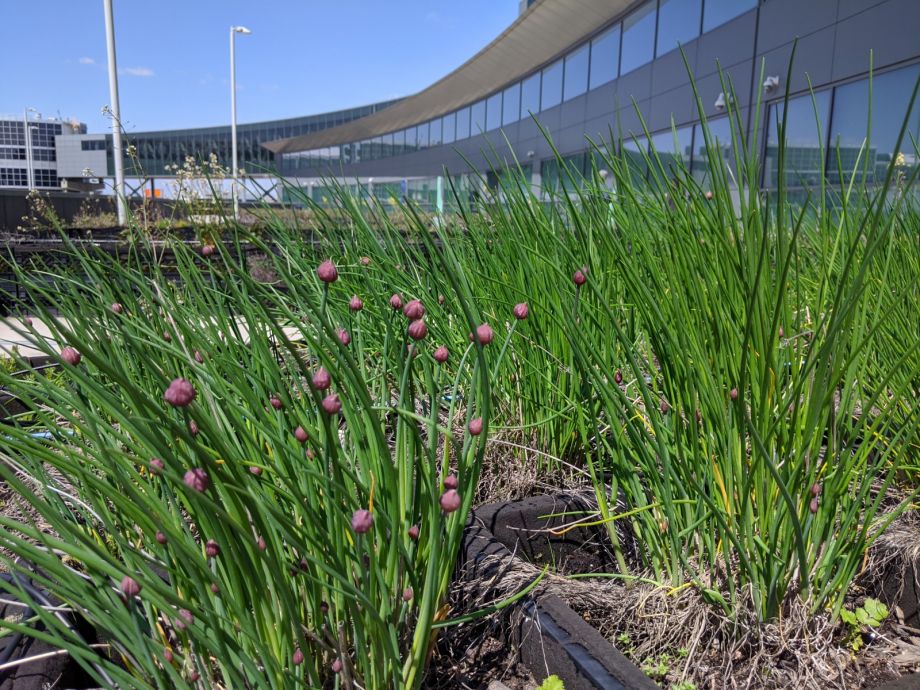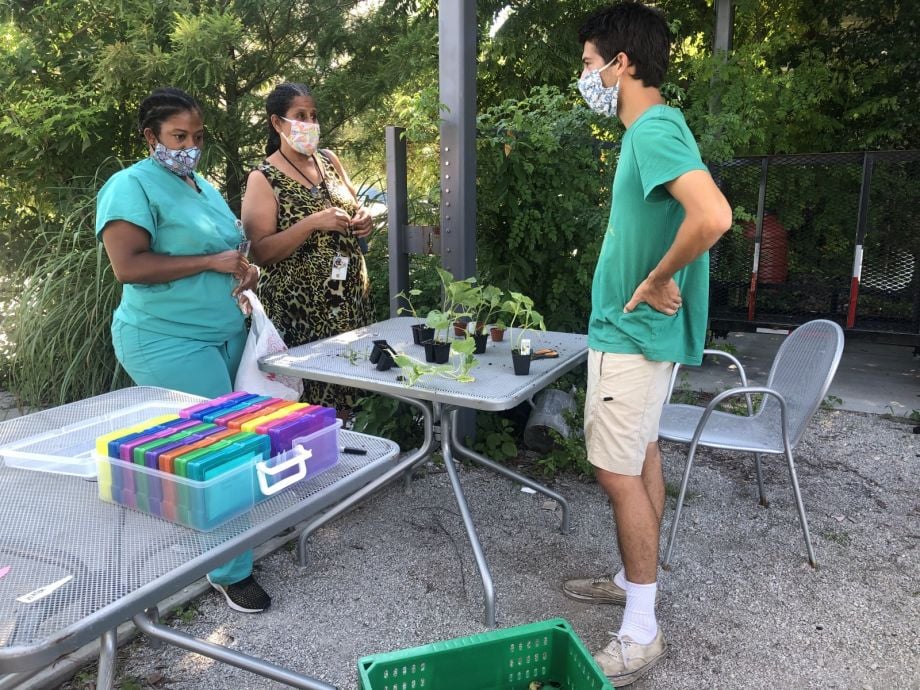Are You A Vanguard? Applications Now Open
Young people with Acta Non Verba's summer camp grow their own food, sell it at area farmers markets and deposit all of the proceeds into individual savings accounts.
Photo by Pete Rosos/2812 Photography
This is your first of three free stories this month. Become a free or sustaining member to read unlimited articles, webinars and ebooks.
Become A MemberOn a morning in early April, a line of people snaked around a Bronx city block. Normally a bustling borough, the area, on this day, was subdued, as most residents heeded the government advice to stay home to stop the spread of COVID19. And yet some 3,000 senior citizens — the majority of them nervous, wearing masks and keeping a safe distance from their line neighbors — found their fear of the contagious illness trumped by a more immediate human need: hunger. Their queue stretched more than a mile as they waited next to their shopping carts for a city councilman to arrive with the pantry staples he had promised to distribute.
But when he showed up, the councilman didn’t have much to offer. He emptied a small grocery bag of its contents: three bags of animal crackers, three single-serving plastic cups of applesauce, and three precooked meals. In an early sign of the many ways in which city government has failed the most needy in its response to COVID, thousands of elderly went home empty-handed that day.
It was enough to make Gail Sharbaan, co-founder and president of the nearby Rivers Run community garden, start to tear up. Volunteering that morning, she took one look at the food on offer and started to cry as she reflected on everything the neighborhood had endured over the preceding weeks. Rivers Run is located in Co-Op City, the world’s largest cooperative housing development, which contains more than 15,000 apartments inhabited predominantly by Black and Latino tenant-owners, many of whom are senior citizens. Co-Op City is home to three very active food pantries which, prior to the pandemic, opened three times a week. But almost overnight, the area became a food desert as local businesses and charities closed or curtailed their hours in response to the virus. As Sharbaan looked over the three high-sodium meals the councilman offered, she came face to face with the sobering new reality of life in Co-Op City.
“The packages said that you could leave them out on the counter for three years and they’d still be good,” she recalls. “Wow. It was scary to me, and it actually made me cry. We have a lot of health issues here in the Bronx, and to be put in that situation, it wasn’t even a choice whether we were able to get healthy foods to our seniors, to our people with limited or different abilities.”
A fixture in the community and an avid gardener who organizes programming and helps maintain Rivers Run’s communal tomatoes, garlic and herbs, Sharbaan knew she had to find some way to help her community continue to eat well in the face of the limitations imposed by the pandemic.
“I knew that tears were not enough to get us out of this blight.”

Milk crate distribution at Rivers Run community garden, part of the Co-Op City housing development in the Bronx. (Photo by Gail Sharbaan)
Sharbaan quickly learned that home-delivered food provided by city outreach programs was just not going to cut it.
“When the city started handing out the food, a lot of times they were putting it at the wrong door, or leaving it in the lobbies down by the elevators where it was less accessible,” she says. “It was very sad here in Co-Op City.”
As she searched for ways to help secure the development’s food supply, Sharbaan connected with Ursula Chanse, director of the New York Botanical Garden’s community gardens outreach program Bronx Green-Up. Chanse told her about a new initiative taken on by a coalition of gardeners, seed-savers and food justice advocates across the city. The recently born Milk Crate Gardens planned to rescue close to 3,000 abandoned milk crates filled with clean soil from a defunct urban farm at JFK International Airport, then distribute them to would-be gardeners across four boroughs. Rivers Run, Chanse said, could loop into the project in order to provide Co-Op City residents with the chance to grow their own food.
As soon as she heard about Milk Crate Gardens, Sharbaan says, she knew it was the right choice for her community. Throughout its 50-year history, Co-Op City has had a strong history of self determination. If it was going to weather the pandemic, it would do so by taking control of its destiny. The opportunity for some residents to feed themselves — without relying on poorly organized and unhealthy government options — seemed, to Sharbaan, an ideal solution.
“It was such a great idea,” she says. “It’s important to be able to grow your own food to learn how to be self-sufficient, so that you have something nutritious in times like this.”
It’s not just in New York City that COVID has redefined how people source their food. Across the country, community gardens and food justice organizations have pivoted their programming in response to the pandemic, shifting their focus from long-term goals to immediate actions that help those in need of healthy food right now. These grassroots groups empower individuals in historically marginalized and underfunded communities — who learned long ago that community born-and-bred projects can be more effective and unifying than waiting for often-lacking governmental aid — to grow their own food in a time of unprecedented economic uncertainty. These relationships also connect city residents with local growers whose crops can supplement their pantries. In this feature, Next City takes a look at Milk Crate Gardens in New York, SPROUT NOLA in New Orleans, and Acta Non Verba in Oakland.
In 2015, JetBlue Airlines made a “big, green statement” by opening a 24,000 square foot rooftop farm featuring nearly 3,000 milk crates filled with Hudson Valley compost and planted with potatoes, herbs and other produce that was utilized by some of the airport’s Terminal 5 restaurants. That year, the T5 Farm also donated nearly 1,000 pounds of harvested produce to food pantries over a three-month period. Over time, however, the project fizzled, and 2019 was the farm’s last growing season. Word about the crates of soil — a prized resource in a city where most ground soil is contaminated — spread through New York’s network of amateur and professional growers, seedsavers and food justice advocates.
In March, members of these groups came together under the banner of the new Cooperative Gardens Commission, a “grassroots collective working toward food sovereignty in response to the COVID-19 pandemic and persistent injustice.” Of that collective, five members started to collaborate on a plan to rescue the defunct crates from JFK and redistribute them to would-be gardeners who, strapped for cash amidst record unemployment, wanted to take food production into their own hands. That core team was made up of Luz Cruz of Cuir Kitchen Brigade, a food/agro project in solidarity with Puerto Rico’s sustainable agroecology movement; Jacqueline Pilati of Reclaim Seed NYC, a seed library and education resource; Candace Thompson of The Collaborative Urban Resilience Banquet, an urban foraging project; Sajo Jefferson, an urban farmer at Farm Clout; Sawdayah Brownlee of the Brooklyn Queens Land Trust; and Lucy Lesser.
Milk Crate Gardens was born. The core team set up an Instagram account to share a Google form NYC residents could fill out to receive up to five milk crates, as well an option for community gardens and organizations. In just a day, the form received a staggering amount of requests and was closed down. As they sorted through the asks, the Milk Crate Gardens team realized that the Google form might have excluded those in communities without much access to the internet. So they reassessed their outreach.
“We were very strategic in wanting milk crate recipients to be folks from historically marginalized communities, low-income households, single-parent households, BIPOC, LGBTQIA communities,” says Jacqueline Pilati of Reclaim Seed NYC. “Midway through, we went back and sent an email out to individuals who had requested crates, to be like, ‘Hey, if you’re still employed, if you’re are able to go to a store and buy your own growing supplies — could you consider donating your request to one of these organizations that are still waiting for delivery?’ About 100 crates were freed up for these community organizations that we really wanted to prioritize,” like a community center in Corona, Queens and a community garden in Sunset Park.
The core team set to work recruiting volunteers to ride out to JFK and physically dismantle the urban farm. Sharing snacks, water and PPE, teams made repeated trips out to Terminal 5 to cut zip ties holding crates together, load them into vans, and drive them off site, and repeated the process over the course of two days.
Work with the volunteers continued over a series of nine distribution days: folks re-loaded vans with milk crates that had been stored at community garden hubs, delivered them to the homes of requestees who were homebound or unable to venture out due to COVID, and dropped crates off at other gardens and institutions that had requested bulk deliveries.

Before going defunct in 2019, the T5 Rooftop Garden at JFK International Airport's Terminal 5 had 24,000 square feet of growing space, all of it in repurposed milk crates. (Photo by Candace Thompson)
On May 23, Gail Sharbaan of Rivers Run joyfully received the garden’s 60-crate request.
“They were some wonderful volunteers,” she says. “Even though it poured and it kept pouring, we still unloaded those crates and put them in the garden for distribution.” The garden’s crates were picked up mainly by the elderly, as well as the differently abled, Sharbaan says.
By early July, all 2,700 crates had been placed into the hands of home growers, community gardens and cultural centers. But the Milk Crate Gardens initiative didn’t end there. Along with their crates, some recipients received seedlings that Lucy Lesser, a core team member, had grown from saved seed provided by Pilati. Candace Thompson included information on how to prepare the overwintered edible plants that some recipients found already growing in their crates, and Luz Cruz’s Cuir Kitchen Brigade distributed a zine on DIY gardening.
“Ultimately, our mission is to help people realize their autonomy over their food, to take food back into their own hands and step away from big agriculture,” Cruz says. “A lot of the communities that we’re focused on are BIPOC, immigrant populations, undocumented populations, low income populations, and otherly abled populations. These marginalized groups are often left out of the missions of the larger nonprofits and NGOs — even though they built the agricultural system of the United States. For us, it’s about giving people their power back.”
In these times of unprecedented societal upheaval and unrest on the streets, gardening also fulfills a more basic need for peace and reflection, Sharbaan says.
“We’ve been running a garden for the past seven years. And what I’ve realized is that growing is very healing to a lot of people.”
A city that has experienced more than its fair share of hardship, New Orleans has also demonstrated incredible resilience. Citizens and community organizers collaborated to rebuild after Hurricane Katrina in 2005, and a number of local projects have endured. One of those successful endeavors is Mid-City’s ReFresh Project, a “community health hub” home to nine organizations working to improve access to fresh food, providing culinary and nutrition education and linking youths with the workforce. SPROUT NOLA, an urban farming coalition that empowers locals to grow their own food at both a hobby and a professional scale, partnered with ReFresh in 2014 and, in the wake of the COVID pandemic, has deepened its efforts to connect local eaters to local growers.
SPROUT has its hands in many garden plots, so to speak. In partnership with other local agricultural organizations, the nonprofit supports beginning farmers and ranchers with community classes, office hours and workshops, as well as bringing established farmers together to share the knowledge, marketing techniques and resources that help grow the city’s local food scene. Through its organizing at the city, state and national levels, SPROUT fosters support for farmers of the Gulf South. It operates a 30-member community garden that builds bonds between neighbors through programming and potlucks, and hosts a year-round farmer’s market where small-scale farmers can sell their goods at fair prices. In March, as the city became an early virus hotspot, the organization marshaled its far-reaching resources to ensure that locals could continue to grow, purchase and sell healthy food.

In response to COVID-19, SPROUT maintained its own garden, helped other community gardens get up and running, and organized seedling giveaways. (Photo by Margee Green)
“We’re in a situation where people have been asked to not work for a very long time,” says former Programs Manager Gabriel Jimenez-Ekman, whose fellowship with SPROUT recently concluded. “It’s been a big disruption, especially for folks who live paycheck to paycheck.”
SPROUT’s mission of building a resilient food system has taken on more weight than ever before, Jimenez-Ekman says.
“When something like a pandemic hits, and paychecks stop coming, making sure that people have access to land and access to the knowledge and resources to grow their own food is very important.”
In response to COVID-19, the nonprofit pivoted several of its programs. It partnered with Crescent City Farmer’s Market and Recirculating Farms Coalition to work with Top Box Foods, an affordable food delivery service, to deliver locally grown peaches, tomatoes, eggplants, corn and other produce. Small boxes of produce from Recirculating Farms cost $16 and large boxes from Crescent City Farmer’s Market cost $30, but with their ‘Market Match’ program, those paying with Supplemental Nutrition Assistance (SNAP) benefits pay half price..
Another source of healthy food has been SPROUT’s own community garden. Though the nonprofit temporarily shut down garden programming in observance of social distancing recommendations, Jimenez-Ekman continued to maintain the garden as well assist volunteers in planting out other neglected community gardens around the city. Once harvested, that food has been delivered, free of charge, to a handful of at-risk and immunocompromised garden members.
“We’re trying to grow as much food as we can,” he says.
In addition to distributing already-grown food, SPROUT is providing city residents with the tools and knowledge to reap their own crops. At the end of March, it started a series of seedling giveaways, teaming up with other community gardens who had been set to plant but who were forced to scale back their production because of a lack of volunteers.
“We sent some emails to specific coalitions of people who we think would be most at risk during coronavirus, those who would be most food insecure,” Jimenez-Ekman says.
Initially run on a volunteer-powered home-delivery model, the seedling initiative is now pickup-based, and, to date, has gifted more than 5,000 starts, including okra, hot peppers, cucumber and watermelon. New growers have the opportunity to link up with virtual gardening coaches, Master Gardeners who accrue volunteer hours by video calling new growers, providing tips, identifying pests and helping map out gardens.
As farmers markets around the city have started to reopen, SPROUT has supported local growers getting back on their feet after a period of extreme uncertainty. At the Crescent City Farmers Market, the nonprofit rents a table for the day and invites its own farmers market growers (from community gardens or small-scale farms in and around the city) to assemble there and hawk their wares without having to lay out cash.
If anything, Jimenez-Ekman says, the coronavirus crisis has only strengthened the city’s food growing scene. Growers have shifted to a CSA-like model of offering subscriptions for prepaid boxes of mixed produce. This change has attracted more shoppers who want to source their food locally, and it’s a model that’s more profitable for the growers as well.
“Local farmers have seen a huge boom and are selling better than they ever have,” he says. “Our food aggregation system used to move $300 or $400 per market day. But now it’s regularly moving $2,500 to $3,000.”
As the city rebounds from COVID and attains some level of normalcy, SPROUT hopes to continue to support its farmers using the lessons gleaned from the pandemic.
“We’ve learned a lot about marketing local food,” Jimenez-Ekman says.
Those lessons will continue to benefit many New Orleanians, from small-scale growers to larger market suppliers, and the eaters who have committed to the safe purchase of nutritious, local fruits and vegetables.
Across the country in Oakland, California, the coronavirus crisis has prompted another food sovereignty organization to take its urban farming outreach program virtual. Acta Non Verba Youth Urban Farm Project is in a neighborhood deemed a food desert by the USDA, with only two grocery stores within three miles providing limited fresh produce. The area has suffered from pollution, disinvestment and crime, where, according to ANV’s website, “Many residents fear allowing their children to play outside, resulting in severed ties between children and the natural world, and a significant reduction in exercise.”
Founded in 2010 by Navy veteran Kelly Carlisle, Acta Non Verba (“deeds, not words”) seeks to rebuild that bridge between kids and nature. On three Oakland farms, local children ranging from five to 12 years old grow their own food, sell it at area farmers markets and through a small CSA, and deposit 100 percent of the proceeds into their own savings accounts. According to Carlisle, 33 kids have opened accounts through the program, and ANV has deposited nearly $10,000 into the accounts over the past 7 years.
Normally, the learning takes place in person, through summer camp, an after-school program and monthly farm days designed for children to experience nature in a safe space. But in late March 2020, when California Governor Gavin Newsom issued a mandatory stay-at-home order, ANV shifted its summer camp completely online — loaning devices and paying for wifi for families who requested assistance. Over the course of eight weeks, campers have maintained their connection to the outdoors through instructors who share information in live sessions on everything from cooking to birdwatching. Older campers have been learning about the waste stream, with the goal of making ANV a certified Zero Waste organization.
“On Fridays, we have open farm time with physical distancing guidelines,” Carlisle says, “so that kids can get outside and actually see what’s what’s growing on the farm. As they relax the shelter-in-place orders, we’re allowing more and more activities to happen.” She notes that despite the shelter-at-home restrictions in the spring, ANV has been able to continue planting “steadily and safely” on two of their three farms.
“The lack of access to healthy food is a form of systemic oppression, All these issues that are coming up now have been issues for generations.”
Photo by Kelly Carlisle
All over the country, educators have faced formidable obstacles keeping children active and engaged throughout the months of stay-at-home. As Carlisle notes, sharing information about what food is and where it comes from actually becomes more important during a pandemic, not less.
“The pandemic kind of ripped the blinders off many communities and individuals about just how tenuous our food system is,” she says. “How we take for granted that the grocery store will always have whatever we want.”
“We’re shining a light on something I think this country has worked hard to keep on the down-low,” Carlisle continues. “This idea that we don’t need to know where the food comes from, because there is always going to be plenty of it? Well, that just isn’t true.”
In an effort to deepen its commitment to Oakland’s food-insecure population, ANV accepts SNAP and EBT, and donates CSA boxes to families in need. ANV also responded to COVID by partnering with Slow Food East Bay to expand its CSA program, benefiting farmers and shoppers alike. Through the partnership, Slow Food purchases produce from disadvantaged farmers in California’s Central Valley and Central Coast who lost a great deal of income when restaurants, their primary customers, closed down. ANV distributes the produce — which likely would have rotted in the fields otherwise — through its CSA, and those proceeds go directly into campers’ savings accounts.
“It’s a win-win situation where we’re able to serve more families here in the Bay Area,” Carlisle says.
Additionally, like Milk Crate Gardens and SPROUT, ANV distributed seedlings to local residents and community gardens. Through partnerships with plant nurseries and private growers, the nonprofit delivered about 300 squash, tomato and leafy green starts. On its Facebook page, farm manager Aaron De La Cerda shares videos providing tips on organic growing and no-till agriculture as a complement to the seedlings.
All aspects of society have been touched by the dramatic upheavals of the past several months, those spurred not just by a global pandemic but also by widespread civil unrest and racial justice protests. As ever, food — our most basic necessity — plays a huge role in how communities will weather these storms.
“The lack of access to healthy food is a form of systemic oppression,” Carlisle says. “All these issues that are coming up now have been issues for generations.”
“At Acta Non Verba, we ensure that we’re giving our participants and their family members the very best that we can,” she continues. “And that’s high-quality produce, locally grown. Good, healthy, wholesome food is a human right.”
This article is part of “For Whom, By Whom,” a series of articles about how creative placemaking can expand opportunities for low-income people living in disinvested communities. This series is generously underwritten by the Kresge Foundation.

Lauren Rothman is a freelance journalist covering issues of farming, food justice, and health and wellness. A native New Yorker, she recently relocated to Oaxaca, Mexico.

20th Anniversary Solutions of the Year magazine